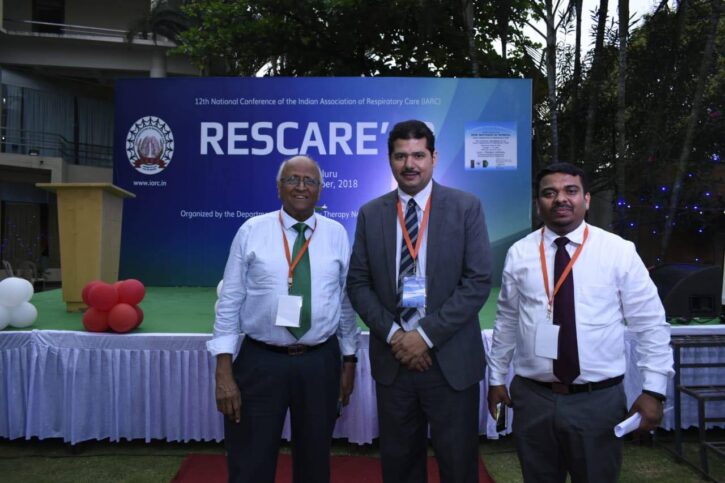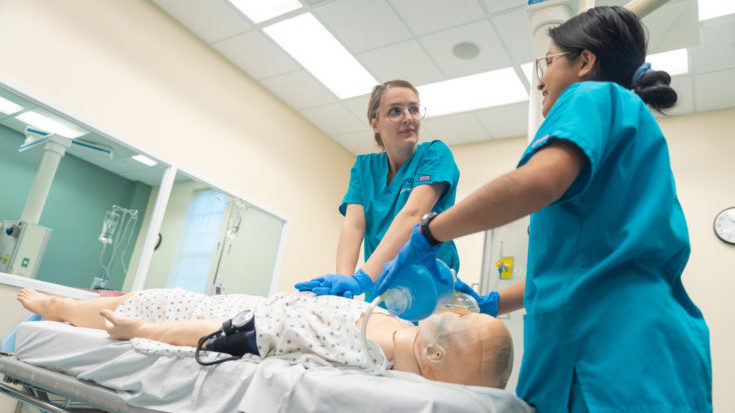
According to Shane Keene, DHSc, MBA, RRT, RRT-NPS, CPFT, RPSGT, FAARC, COO of the Commission on Accreditation for Respiratory Care (CoARC), there are currently 23 fully accredited degree completion programs in the U.S., 19 at the baccalaureate level and four at the master’s. Together, these programs educate the next generation of respiratory care leaders, who will play a key role in moving the profession forward.
“A respiratory therapist that is looking to advance into leadership, management, or educational roles within the profession will require a baccalaureate degree minimally to do so,” said Dr. Keene. “Degree advancement programs afford respiratory therapists the ability to enter the workforce full-time and simultaneously work on an advanced degree.”
425 and counting
One such program has smashed the record in terms of the sheer volume of students. RT educators at Boise State University began their online degree advancement program in 2007 with just nine students. Today the enrollment stands at 425.
The degree advancement program is now the largest such program in the nation. Designed especially for working therapists, the program allows practitioners to create a plan for completion based upon their work, family, and personal commitments.
“Students can take one or two courses each seven weeks, and for the most part, they get to choose the order in which they take those courses,” said Associate Professor Jody Lester, MA, RRT. In addition, because the program does not lock students into cohorts, it is easy for them to step out of a seven-week session or semester and then jump right back in when they are ready.
Program Director T.J. Wing, EdD, RRT, says therapists who graduate from the RRT-to-BSRC program are actively recruited to work in roles ranging from the advanced therapist to the hospital administrator to educator and more.
“A BSRC brings a myriad of benefits both personally and professionally,” Dr. Wing said. “Many times, without the degree, those higher-level jobs are simply not obtainable.”
Kristen McHenry, EdD, RRT, RRT-ACCS, an assistant professor in the program, agrees therapists who go for the advanced degree set themselves apart from the crowd.
“Obtaining a BSRC will better prepare graduates for positions of leadership, management, education, research, and even advanced clinical practice,” she said. “I like to think of continuing education as an opportunity to demonstrate our knowledge, skillset, and overall value to the interprofessional health care team and the communities we serve.”
With the four-year entry-to-practice BSRC program at Boise State, the RRT-to-BSRC program graduates around 150 new therapists each year.
Important to the profession
Texas State University has had a BSRC program in place for 49 years now, but three years ago, they decided to augment that four-year program with an online degree advancement program for working RTs.
“In Texas, there are approximately 15,000 RTs, and less than 10% have a bachelor’s degree,” said Department Chair Greg Marshall, PhD, RRT, RPSGT. “In developing our online BSRC, we looked at the topics and courses in associate degree programs and compared the content to course content found in BSRC programs,” he said. ”The advanced courses provide important concepts and information that we believe take RTs to the next level of being prepared to demonstrate leadership in the hospital.”
Enrollment in the program has grown from 12 students in the inaugural year to 41 today. As of the spring of this year, 16 have graduated. Students are accepted each semester rather than just once a year, which frees them up to enroll when the time is right for them, and part-time students are more than welcome. In addition, students can easily switch from full-time to part-time anytime their personal or work schedule calls for a change.
Each session is just eight weeks in length, making it easy to fit the program into the busy lifestyle of the average working RT. Courses run the gamut from leadership and management to neonatal critical care, advanced ventilator concepts, respiratory care research, and more.
Challenge equals reward
Amanda Dexter, MS, RRT, CHSE, clinical assistant professor and BSRT program coordinator at the University of North Carolina (UNC) at Charlotte, says their degree advancement program was established in 2007. The program works to provide graduates with the additional knowledge and skills to meet future practice demands and their own professional goals.
“The UNC Charlotte BSRT program challenges students and provides them with rewarding opportunities to confidently become a stronger learner, caregiver, and leader,” she said. The program typically admits about 75 students per cohort, a number she believes allows for personal and active faculty-student engagement and an inclusive online learning environment. The program graduates around 60-70 BSRT students each year and has an on-time graduation rate of 84%.
“Advanced education is meant to challenge students,” Dexter said. “Without challenge comes no reward. While many BSRT students have ample experience at being respiratory therapists, our program is asking learners to take it to the next level.”
She believes these students are prepared to step into leadership roles, often in areas of the medical field that they never even considered before.
“Graduates from our advanced degree programs have become respiratory pharmaceutical specialists, ventilator manufacturer consultants, and even respiratory simulation educators,” she said.
Increasing demand
The BSRC degree advancement program at the University of Cincinnati averages about 61 graduates per academic year, and most of the feedback from graduates indicates they are moving into management positions.
“The students are earning the minimum requirement for management at their organizations,” said Assistant Professor Natasha Howard, DNSc, RRT.
She believes the COVID-19 pandemic has increased the number of RTs interested in earning a bachelor’s degree.
“We were expecting our numbers to drop, but seemingly more students are interested in getting their degree, and more students are showing an interest in enrolling,” she said.
Dr. Howard says therapists who enroll in a degree advancement program walk away with a more robust understanding of evidence-based competencies and an enhanced ability to think critically, two things that position them for future success.
“More students are seeking their BS degree and are realizing the need for a bachelor’s or master’s degree to move ahead in the profession,” she said. “Degree advancement programs offer the best opportunities for working respiratory therapists to accomplish this.”
Show me the money
RTs considering a degree advancement program have many objectives, but in the minds of some, the potential for higher earnings tops the list. However, anecdotal stories indicating there is no boost in pay often has them thinking twice.
So, do bachelor’s prepared RTs earn more than their associate’s prepared colleagues? The answer to that question requires some forward-thinking, say these educators.
Greg Marshall likens the situation to that seen in the nursing profession.
“The associate degreed RN makes the same starting salary as the BSN, but within five years, there can be a big difference in job role and wages. RTs experience the same — advanced degrees equate to advanced opportunities and wages,” Marshall said.
Amanda Dexter agrees.
“The AARC 2014 Human Resources Survey found that each increase in academic degree earned was associated with an increase in annual compensation,” she said. “Employers understand and realize the commitment put into obtaining a higher education and want to recognize and highlight those achievements.”
CoARC’s Shane Keene believes market forces at present — largely caused by the pandemic — have created new demands for respiratory therapists and thus leveled the playing field when it comes to some opportunities. However, that will change once COVID is finally behind us.
“Degree advancement is increasing the number of baccalaureate-prepared therapists in the workforce, and over time graduates who are applying with an associate degree for new positions could be at a competitive disadvantage when applying against graduates with a higher degree,” he said.
In other words, while the BSRC may not immediately pay off in higher salaries or greater opportunities, down the line, it will.
Spreading the word
Of course, it’s not just about money or the job title you hold. Jody Lester says these programs deliver something else too that is priceless to RTs — the ability to provide enhanced patient care. She shares this recent “thank-you” her program at Boise State received from a student to illustrate the real-world benefits —
I just wanted to share an encounter I had with a patient yesterday at the end of my shift. It was 40 minutes till report and change of shift time, and I was finishing up my last patient — a CHF/COPD exacerbation.
This was his second time in the hospital, and he asked me why I thought this kept happening to him. After I explained how heart failure worked, I asked him if he was a smoker (I had already read in his chart that he was). He said, “No, I quit!” Meaning he was quitting right now. He went on about how he wanted his life back and needed to make some changes. He said he had quit for three years but started again.
It was like he queued up the script I had written for my motivational interviewing assignment. He played his part, and I played mine as we talked about how he had quit before and would he be able to use those tactics again. I don’t think I would have done that in the past at the end of a busy day, but since I had just practiced all that the week before, it came out naturally—some unexpected rewards from the class.
A few tips
Going back to school after entering the profession can seem overwhelming, but it can be well worth the effort. The educators in this story have some excellent advice for anyone still on the fence about enrolling in a BSRC degree advancement program —
- I think it is important that RRTs who are considering earning their BSRC explore the Program Learning Outcomes and curriculum of any RRT to BSRC programs they are considering. Those learning outcomes and course descriptions should clearly help a practitioner identify new skills, content, and knowledge they will develop, as well as those that will build on what they learned in their AS programs. — Jody Lester
- Truly reflect on what you want out of your career in respiratory care. If you have the support of family, friends, and colleagues and the time necessary to dedicate yourself to the journey, then a degree advancement program is for you! Your individual success and growth can influence the entire profession. You will be setting a great example for colleagues who may also be considering the same path. — Kristen McHenry
- First, I would remind RTs everywhere that ‘education is the great equalizer.’ Regardless of our background and roots, education continues to be the most important experience that can power our career and professionalism forward. In one year, AAS/AS RTs can reach the BSRC level. In an additional 1.3 years, they can complete their MSRC degree. So, from ‘associate degree to MSRC in 2.3 years’ is our motto around here. We want all RTs to know they have the opportunity, and we want to help them achieve their life goals in the profession. — Greg Marshall
- First and foremost, take the leap and pursue your degree. It’s worth it! For those who are currently pursuing their degree during this pandemic, my best advice for them would be: be patient with yourself and take the time for self-care. You will definitely have challenging moments where you don’t think that you will make it. By taking the steps one step at a time, eventually, you will finish! — Natasha Howard
- My five tips for success in a BSRT program are: (1) Connect with your instructors early, (2) Actively participate in class for increased academic achievement, (3) Create a schedule and practice time management, (4) Have a consistent workspace and eliminate distractions, (5) Reserve “self-care” time each day to decompress and relax. — Amanda Dexter
The AARC offers much more information about degree advancement here. Use CoARC’s Find an Accredited Program tool to peruse all the accredited degree advancement programs available today. (Choose “degree advancement” from the drop down “Category” menu.)
Email newsroom@aarc.org with questions or comments, we’d love to hear from you.













